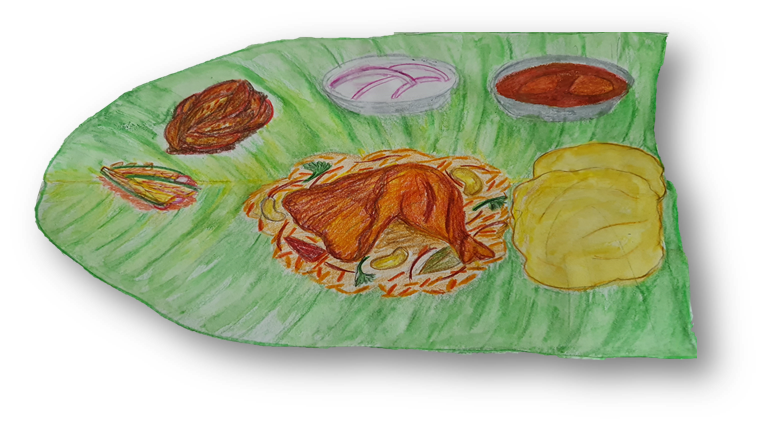Most of us would probably agree that food prepared with love is the tastiest. The same could be said about parenting. With the right strategies, mindset and most importantly – love – a child can learn to thrive and flourish. In this article, Mr Raj, father of Kirisnah, our Sheltered Workshop trainee, draws an analogy between his parenting experience and serving a nice warm meal of biryani, a dish enjoyed by his whole family.
There are many ingredients that go into making this popular traditional Indian dish. Like biryani, caregiving comprises many distinctive elements. We have to manage our expectations and customise our approach to better support our children with autism in their development.
What makes a biryani special? Is it the ingredients, the blending of spices or the cooking techniques? Well, each plays an important role. And the taste of biryani is further enhanced by other factors such as the ambience, company and even the diners’ emotions.
Just like how no two biryanis will taste the same, children with autism all have different personalities and preferences. Hence, each family will face different challenges while managing their children’s daily struggles, and that will require creativity.
Any biryani enthusiast would agree that the artful combination of the side dishes is what truly creates the best tasting experience. Similarly, to achieve meaningful interactions with our children, we need to set aside time, love, the right mindset and the use of suitable techniques.
Let me elaborate my perspective through a personal encounter.
Years ago, I found my boy throwing a tantrum when I return from grocery shopping. This usually happens when he smells something that he dislikes. But in this case, my wife and I could not locate his source of distress. The same scenario repeated itself when our family received a hamper from a friend. This time, we went through with our son to identify the object of abhorrence. To our surprise, it was the smell of ripe bananas.
This incident has left a deep impression on me. Effective parenting requires a combination of elements, akin to how different ingredients blend to give the biryani a rich flavour. When managing their children, parents need to exercise moderation. This is especially so when caring for our children with autism – we need to apply reasonable judgement and prudence in our day-to-day interaction with them.
Whenever my son experiences any distress, I would set aside time to give him undivided attention. Time comes to a standstill. Nothing is more pressing than resolving his concern. I focus on ensuring that his needs are met. At that moment, I want to let him know that we are here to journey with him.
Still, time itself is inadequate to describe what had transcended. Parenting requires me to recognise my son’s underlying issue. After that first encounter with the ripened bananas, I was resolved to identify the trigger behind his every outburst. I have learnt to adopt a curious and non-judgemental approach towards him. With that, it deepens my understanding of how autism interacts with his behaviour.
Over time, I have learnt to customise my intervention. During our second encounter, together with my wife, we re-enacted the moment when the hamper was presented to us. Using fruits toys, we guided our son to communicate his needs. In the process, we gained a better appreciation of his behaviour. More importantly, our relationship becomes closer. After all, successful parenting is built upon numerous failures.
To sum up, caring for a child with autism requires a personal touch. Autism has influenced our children’s thinking, reactions and behaviour. We need to develop an interest to understand the challenges and struggles that autism entails. Through acceptance, we demonstrate openness to embrace new ideologies and improve our parenting approach. Hence, our mindset is the yardstick for our children’s success or otherwise.
So, strive to understand your children’s preferences and be a supportive partner in their journey. May my sharing inspire you to create your own personal biryani experience with your child.
Cover photo credits: Kalyani K





